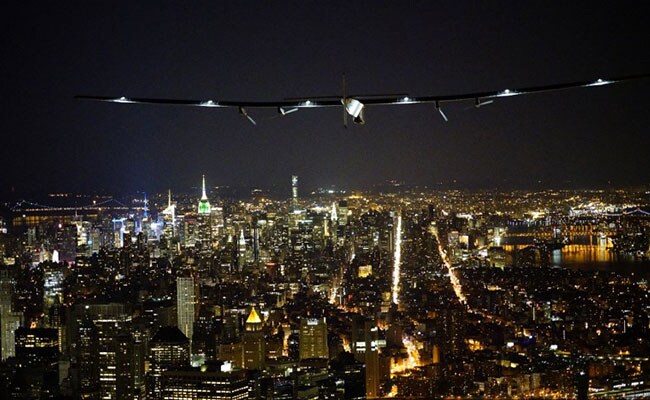
Swiss adventurer Bertrand Piccard tweeted the picture from his '#Si2 (Solar impulse 2) home'
New York:
The Solar Impulse 2 aircraft passed the halfway mark of its marathon flight across the Atlantic late Tuesday, one of the most challenging legs of its historic sun-powered journey around the world.
The experimental plane, which took off from New York's John F Kennedy airport on Monday, is being piloted by Swiss adventurer Bertrand Piccard, who is expected to spend between 90 and 110 hours crossing the Atlantic en route to Spain's Seville Airport.
At about 7:15 pm New York time (2330 GMT), the plane was halfway to its destination, the Solar Impulse organisation said on Twitter.
Less than an hour later, it was flying over the tiny Azores islands. A live feed showed Piccard flying through complete darkness.
The plane is powered in the night sky by the energy stored in its 17,000 photo voltaic cells.
 The voyage marks the first solo transatlantic crossing in a solar-powered airplane and is expected to last up to four consecutive days, depending on weather.
The voyage marks the first solo transatlantic crossing in a solar-powered airplane and is expected to last up to four consecutive days, depending on weather.
The first day in Piccard's ocean-crossing saw whales cavorting in the waters beneath the plane, a gorgeous full moon in the night-time sky, and more.
"You will not believe me, but to my right, I see an iceberg in the Atlantic Ocean. Check it out!" Piccard wrote on the online blog he and fellow pilot Andre Borschberg have been keeping.
Piccard, who is taking catnaps during the marathon flight, has sounded exhausted but exhilarated by the challenge.
"Just got up from resting," he wrote on his Twitter account shortly after 0600 GMT, as day was breaking.
"Still a little tired but happy to see the sunrise while sitting in my little #Si2 home."
No heavier than a car but with the wingspan of a Boeing 747, Solar Impulse is being flown on its 22,000-mile (35,400-kilometer) trip in stages, with Piccard and his Swiss compatriot Borschberg taking turns at the controls of the single-seat plane.
Borschberg piloted the flight's final Pacific stage, a 4,000-mile flight between Japan and Hawaii that lasted 118 hours, smashing the previous record for the longest uninterrupted journey in aviation history.
The plane, now on the 15th leg of its east-west trip, set out on March 9, 2015 in Abu Dhabi, and has flown across Asia and the Pacific to the United States with the sun as its only source of power.
The plane typically travels at a mere 30 miles per hour, although its flight speed can double when exposed to full sunlight.
The experimental plane, which took off from New York's John F Kennedy airport on Monday, is being piloted by Swiss adventurer Bertrand Piccard, who is expected to spend between 90 and 110 hours crossing the Atlantic en route to Spain's Seville Airport.
At about 7:15 pm New York time (2330 GMT), the plane was halfway to its destination, the Solar Impulse organisation said on Twitter.
Less than an hour later, it was flying over the tiny Azores islands. A live feed showed Piccard flying through complete darkness.
The plane is powered in the night sky by the energy stored in its 17,000 photo voltaic cells.

The sun-powered Solar Impulse 2 aircraft flying over New York City after Andre Borschberg took off from Lehigh Valley to New York. (AFP Photo/Solar Impulse 2)
The first day in Piccard's ocean-crossing saw whales cavorting in the waters beneath the plane, a gorgeous full moon in the night-time sky, and more.
"You will not believe me, but to my right, I see an iceberg in the Atlantic Ocean. Check it out!" Piccard wrote on the online blog he and fellow pilot Andre Borschberg have been keeping.
Piccard, who is taking catnaps during the marathon flight, has sounded exhausted but exhilarated by the challenge.
Feeling quite tired after 44 hours of flight, I have to cope with some turbulences over the #Azores islands. pic.twitter.com/D88u6Rzq9q
— Bertrand PICCARD (@bertrandpiccard) June 22, 2016
"Just got up from resting," he wrote on his Twitter account shortly after 0600 GMT, as day was breaking.
"Still a little tired but happy to see the sunrise while sitting in my little #Si2 home."
No heavier than a car but with the wingspan of a Boeing 747, Solar Impulse is being flown on its 22,000-mile (35,400-kilometer) trip in stages, with Piccard and his Swiss compatriot Borschberg taking turns at the controls of the single-seat plane.
Making the #impossible possible is a question of mindset: seeing obstacles as opportunities, welcoming #change pic.twitter.com/M6sjfzvTYw
— André Borschberg (@andreborschberg) June 21, 2016
Borschberg piloted the flight's final Pacific stage, a 4,000-mile flight between Japan and Hawaii that lasted 118 hours, smashing the previous record for the longest uninterrupted journey in aviation history.
The plane, now on the 15th leg of its east-west trip, set out on March 9, 2015 in Abu Dhabi, and has flown across Asia and the Pacific to the United States with the sun as its only source of power.
The plane typically travels at a mere 30 miles per hour, although its flight speed can double when exposed to full sunlight.
Track Latest News Live on NDTV.com and get news updates from India and around the world

